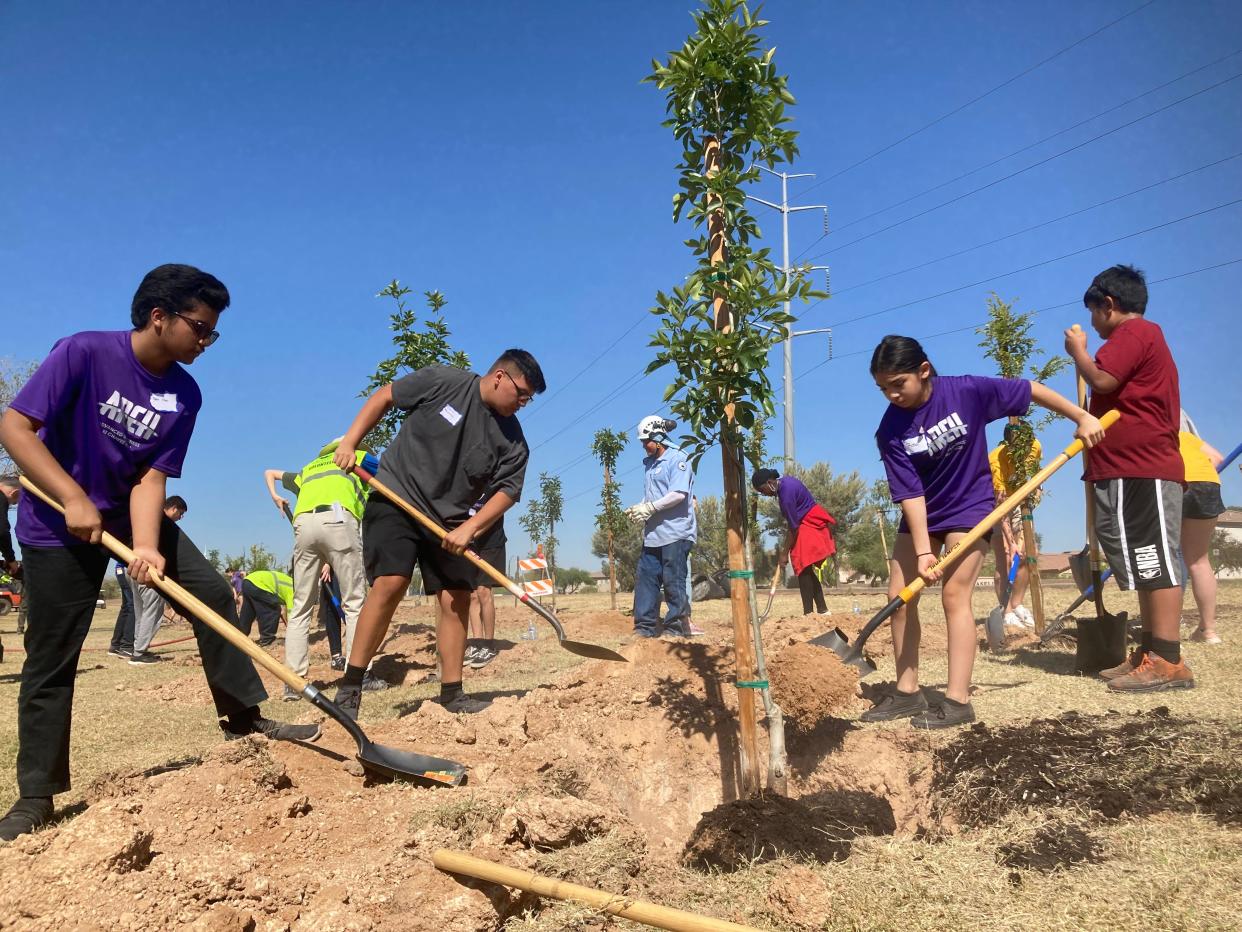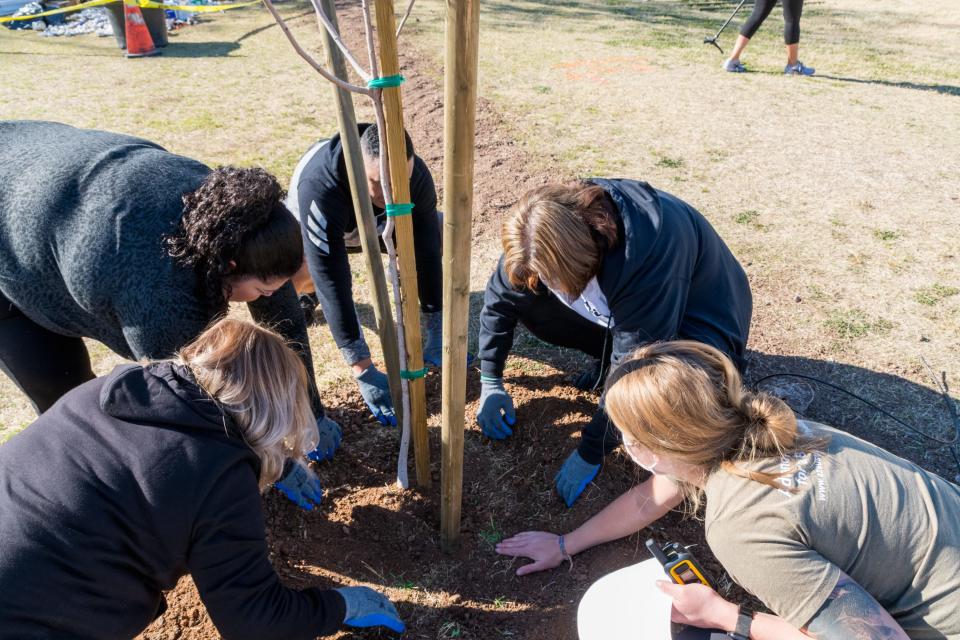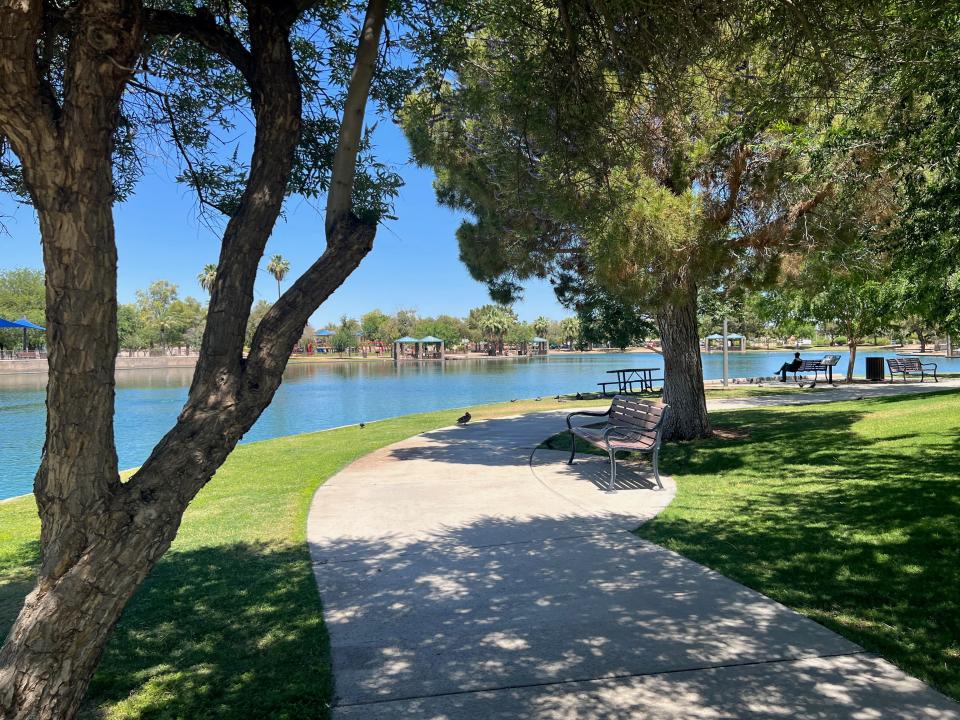Environmentalists grow frustrated as lawmakers cast shade on bills instead of schools

It was already warm for a February day when Vania Guevara, advocacy deputy director for CHISPA Arizona, stepped to the mic at Wesley Bolin Memorial Plaza near the state capitol with a dozen local environmental activists fanned out on the stage behind her.
"We envision communities that enjoy clean air, clean water, open space and parks and the security of knowing that our planet can sustain us today and for future generations," she told those gathered last week for the Environmental Day at the AZ State Capitol event organized by the Grand Canyon Chapter of the Sierra Club. "This is why we are so excited to work with Sen. Mitzi Epstein and our community partners to submit historic legislation that will get us closer to tree shade equity for our communities."
Beyond the crowd of about 100 people squinting into the sun in her direction, Guevara's view included the state Senate and House buildings, where newly introduced bills were receiving readings and the chance to continue in the process of changing state policy. She hoped the legislation she'd come to support, called "Trees for Kids" and submitted as Senate Bill 1689, would soon be among them.
CHISPA Arizona, a program of the League of Conservation Voters that works to engage citizens on environmental justice issues affecting the state's Latinx communities, partnered on this effort with organizations including Project Roots, Tiger Mountain Foundation, Trees Matter, Tucson Clean and Beautiful and Unlimited Potential. They're asking for $400,000 from the state general fund to be put toward planting shade trees on the campuses of lower-income schools, defined as those with 75% or more students eligible for free or reduced priced lunch.
Of Arizona's nearly 2,300 public elementary and secondary schools, more than 1,300 are classified as Title 1 schoolwide, meaning that at least 40% of their students are considered low-income, according to the National Center for Education Statistics. In metro Phoenix, many of these schools are located in the southern and western parts of the valley, which tend to have higher percentages of Latinx residents in addition to documented higher temperatures and lower tree cover compared to more white and affluent areas like Scottsdale in the northeast.

Earlier this month, Sen. Mitzi Epstein, a Democrat who represents Legislative District 12 in a southern part of Maricopa County bordering Pinal County, introduced the bill, which received a second reading on the Senate floor, the last step before being assigned to a committee.
But the window for it to be considered in the current state legislative session is rapidly closing. If it's not moved to committee by Friday, the bill is likely dead for the year. And it is nowhere on the scheduled agenda.
“We only have about a week to push for something like this, so there’s high stakes, high pressure," said Nuvia Enriquez, CHISPA Arizona's deputy communications director.
Legislative environmental priorities:Water, climate change, land protection are key legislative issues for environmental groups
The group has been circulating a petition in support of SB1689 that explains the importance of trees to student performance. According to the latest report on "The State of Arizona Latino Education, Power and Influence" by the education justice group All In Education, "climate and environment has been identified as one of nine factors that have the biggest effect on student academic outcomes," the petition reads.
If the bill isn't heard by a committee this week, the odds of which are slim given that agendas are set, addressing student heat disparities by funding tree planting will likely be put on hold until next year.
Stories of ourselves, our communities, our kids
Most bills regarding environmental issues so far this year have met this same fate of being denied scheduled committee hearings, Enrique said.
For her, it's personal. Enriquez grew up in Central Phoenix and some of her earliest memories are of being at schools without many trees. She attended Kennedy, Creighton and Loma Linda elementary schools and Camelback High School. Many among CHISPA Arizona's organizing group shared similar experiences when they were putting together education materials on SB1689 ahead of the capitol event.
"The team very much reflects the people that we serve," she said. "We have these stories of ourselves and our communities. Our kids still go to schools that don't have trees. So when it's hot, and we get to about 120 degrees most years at some point, kids are having to go out for recess or lunch in places where they don't have access to shade. That's why this is important. Even if the bill doesn't move forward. It's important for us to bring attention to these issues."
Moms fight climate impacts on kids:Can an 'army of moms' slow climate change to spare their children a fossil fuel future?
In 2017, The Republic placed temperature sensors in two yards, one with sparse tree cover in a south Phoenix neighborhood and one in a more shaded, wealthier area of central Phoenix. The devices documented a 9-degree temperature difference at 11 p.m. on Oct. 1. Other studies have reached similar conclusions. A 2007 study conduced by researchers at the University of California, Riverside found that temperatures dropped one-half degree for every $10,000 increase in a Phoenix neighborhood’s median income, due to disparities in vegetation cover.
“When we look at the distribution of temperature throughout metropolitan Phoenix, there’s disproportionate stress on certain social groups,” Darren Ruddell, a University of Southern California geographer, told The Republic in 2017. Those at greater risk of suffering from heat include people with health issues in addition to low-income, minority and elderly residents.
Children are also more vulnerable to the effects of extreme heat, due in part to their smaller body sizes and less-developed organ systems. University of Arizona climate scientist Joellen Russell was motivated to help launch Science Moms, a nonpartisan education organization to mobilize moms against climate change, after her daughter Maeve got heat stroke while riding her bike around their Tucson neighborhood on a summer day.
Climate change also affects students' abilities to learn and function on hotter school campuses. As any member of CHISPA Arizona will tell you, planting shade trees has been found to be an effective way to reduce these negative outcomes.
Bills need campaigns, too
Toward the end of the Feb. 7 capitol event, several lawmakers crossed 17th Avenue to share updates on their struggles to pass environmental legislation.
Sen. Juan Mendez, D-Tempe, lamented the fact that Arizona still doesn't have a state climate action plan, saying this hinders efforts to "get organized at the state level." He said it's not enough for voters to just get Democrats elected. Individual bills must have campaigns of their own and a show of public support.
Mendez introduced SB1509 this year, which calls for an "Arizona Climate Resiliency Planning Group" that would represent diverse interests and work to develop an inventory of statewide greenhouse gas emissions and a plan to reduce them in the name of climate resiliency. The bill was assigned to a committee on Feb. 2 but has not received a hearing.
Arizona agencies can't report emissions:The EPA released state-specific emissions reports. Arizona isn't on the list
"Our bills right now, the Republicans are just tossing them in the trash," said Rep. Oscar De Los Santos, D-Phoenix, who is the main sponsor of HB2244, an environmental justice bill that has met with the same fate as Mendez's SB1509. "You need to pressure the hell out of them. You need to blow up their phones or emails and show them that the people of the state of Arizona are clamoring for change."
In a short speech charged with frustration, Rep. Stephanie Stahl Hamilton, D-Tucson, told those gathered that she feels her Republican colleagues are "too busy relitigating the 2022 election, trying to make voting harder, putting targets on the backs of our LGBTQ children, and working to dismantle our public education system" to give much-needed attention to climate legislation. She introduced several water-related bills in the house this year, HB2164, HB2165 and HB2522, none of which seem likely to move forward.
Newly-elected Sen. Priya Sundareshan, D-Tucson, remains optimistic in the face of her bill to advance a transition to electric vehicles, SB1442, and her bill to improve water quality, SB1440, both stalling out after second readings on the Senate floor.
"Unfortunately, many great Democratic ideas haven't been moved forward," Sundareshan said. "Let's talk about energy and climate change, because those are huge issues of great importance that we haven't given a lot of attention to."
Musical trees:Making tree rings sing: Researchers find musical muse in forest climate data
Bills to watch and how to watch them
In the current state legislative session, Democrats have given attention to issues of climate and the environment in the form of more than a dozen introduced bills. But few seem poised to make it past Friday's deadline of being assigned to a committee.
In addition to Epstein's Trees for Kids bill, De Los Santos' SB1508 addresses environmental injustices by calling for limits on how many major polluters can be sited in lower-income neighborhoods. Several bills seek to bring climate action into focus in Arizona by establishing committees to facilitate electric vehicle usage, install more solar panels or reduce greenhouse gas emissions. Others offer solutions to water limitations by requiring broader assessments of the effects of development on rivers and watersheds.
As the session moves forward and many bills don't, updates on these proposals can be found by entering the bill number on the Arizona Legislature's Bill Status Inquiry website at https://apps.azleg.gov/BillStatus/BillOverview.

Environmental justice bills that environmental groups support:
SB1508/HB2244: Would require environmental justice impact statements to be developed with public input before new permits for polluting facilities could be issued in overburdened areas.
SB1689: Would fund planting trees at schools in lower-income neighborhoods.
Climate and clean energy bills that environmental groups support:
SB1441/HB2241: Would fund a pilot program to prepare homes for electric vehicle charging.
SB1537/HB2279: Would undo requirements that agencies like the Arizona Department of Environmental Quality get legislative authority before acting to reduce greenhouse gas emissions.
SB1522/HB2405: Would establish a committee to study community choice energy models.
HB2519: Would establish a committee to study agrivoltaics, or installing solar panels over farm fields.
SB1399: Would create a fund to help cities, towns, counties and tribes affected by coal plant closures transition to a clean energy economy.
SB1442: Would establish a committee to study the most economically-viable ways to transition to electric vehicles.
SB1509: Would create an Arizona Climate Resiliency Planning Group to review and recommend changes to statewide greenhouse gas emissions toward a resiliency plan.
Water bills that environmental groups support:
SB1449/HB2164: Would allow the Arizona Department of Environmental Quality to consider future impacts in declaring irrigation non-expansion areas.
SB1450/HB2165: Would expand requirements for development to consider whether there is adequate water supply beyond active management areas.
HB2278: Would limit new wells in the Upper San Pedro and Verde Valley to protect those watersheds.
SB1558/HB2522: Would recognize the water needs of ecosystems and wildlife as a protected, beneficial use.
SB1440: Would allow the Arizona Department of Environmental Quality to establish water quality standards for harmful chemicals known as PFAS.
Bills that environmental groups oppose:
HB2440: Would prevent public power entities from considering issues of sustainability, carbon emissions, air pollution and water use when determining affordability and reliability of energy infrastructure.
SB1139/HB2471: Would prohibit the State Treasurer from considering environmental, social or governance goals when making investment decisions.
SB1500: Would prohibit state investments from boycotting energy companies that engage in fossil fuel and nuclear energy processes.
SB1612: Would authorize the State Treasurer to limit public investment in financial institutions that have environmental, social and governance policies or that boycott fossil fuels.
HB2065: Would make dry washes and arroyos exempt from the Clean Water Act and state permitting.
HB2442: Would allow for the establishment of non-expansion areas that limit new agriculture, but only temporarily, offering limited benefits to aquifers.
SB1257: Would require the Department of Water Resources to appoint an assistant director to address water augmentation with the Water Infrastructure Finance Authority, which environmental groups feel overshadows conservation efforts.
Read the climate series:The latest from Joan Meiners at azcentral, a column on climate change that publishes weekly
Joan Meiners is the climate news and storytelling reporter at The Arizona Republic and azcentral. Before becoming a journalist, she completed a doctorate in ecology. Follow Joan on Twitter at @beecycles or email her at joan.meiners@arizonarepublic.com.
Support climate coverage and local journalism by subscribing to azcentral.com at this link.
This article originally appeared on Arizona Republic: Environmental advocates say lawmakers won't act on their bills

